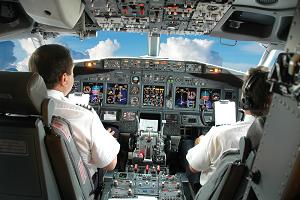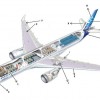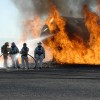Crew Resource Management (CRM)
[audio:https://aviationenglishblog.com/wp-content/uploads/2010/08/15crm.mp3|titles=CRM]TOPIC: Crew Resource Management (CRM)
GOAL: To learn about the importance of CRM and how it’s vital to safety
Level: Easy
Exercise #1: Read about CRM and then proceed to Exercise #2
Crew Resource Management (CRM) training originated from a NASA workshop in 1979 that focused on improving air safety. The NASA research presented at this meeting found that the primary cause of the majority of aviation accidents was human error, and that the main problems were failures of interpersonal communication, leadership, and decision making in the cockpit. Originally, this concept was called Cockpit Resource Management because issues and communication among pilots was the core focus. However, over time, the name was changed to Crew Resource Management after the aviation industry realized that safety lies with everyone that is involved with flight.
 From baggage handlers and reservations agents to flight attendants and 747 Captains, everyone needs to work together to ensure a safe flight. CRM training encompasses a wide range of knowledge, skills and attitudes including communications, situational awareness, problem solving, decision making, and teamwork; together with the entire attendant sub-disciplines which each of these areas entails. CRM can be defined as a management system which makes optimum use of all available resources – equipment, procedures and people – to promote safety and enhance the efficiency of flight operations.
From baggage handlers and reservations agents to flight attendants and 747 Captains, everyone needs to work together to ensure a safe flight. CRM training encompasses a wide range of knowledge, skills and attitudes including communications, situational awareness, problem solving, decision making, and teamwork; together with the entire attendant sub-disciplines which each of these areas entails. CRM can be defined as a management system which makes optimum use of all available resources – equipment, procedures and people – to promote safety and enhance the efficiency of flight operations.
CRM is concerned not so much with the technical knowledge and skills required to fly and operate an aircraft but rather with the cognitive and interpersonal skills needed to manage the flight within an organized aviation system. In this context, cognitive skills are defined as the mental processes used for gaining and maintaining situational awareness, for solving problems and for making decisions. Interpersonal skills are regarded as communications and a range of behavioral activities associated with teamwork. In aviation, as in other walks of life, these skill areas often overlap with each other, and they also overlap with the required technical skills. These skills are not confined to multi-crew aircraft, but also relate to single pilot operations, which also need to interface with other aircraft and with various ground support agencies in order to complete their missions successfully.
CRM training for crew has been introduced and developed by aviation organizations including major airlines and military aviation worldwide. CRM training is now a mandated requirement for moist commercial pilots worldwide.
Exercise #2: Watch two videos about CRM:
- Bill Schuler, Director of Training and Education for Safer Healthcare, discusses communication, an important element in good CRM.
- Watch this pre-departure briefing produced by the FAA.
- A video reenactment of Eastern Airlines Flight 401 which crashed into the Florida Everglades while on approach to Miami International Airport.
Exercise #3: Answer the following questions, which are based on the information contained in the text and videos you’ve just studied.
- True or False: The initials ‘CRM’ have always stood for Crew Resource Management.
- True
- False
Answer = a
- CRM originated from a _____ workshop in 1979 that focused on improving air safety.
- FAA
- ICAO
- NASA
- NTSB
Answer = c
- _____ is the perception of environmental elements within a volume of time and space, the comprehension of their meaning, and the projection of their status in the near future.
- vertigo
- interpersonal skills
- CRM
- situational awareness
Answer = d
- According to Bill Schuler’s video interview…
- CRM is not always necessary
- Proper communication is vital to good CRM
- Pilots are the only professionals that need to use CRM
- CRM is only practiced in the United States
Answer = b
- What did you see as prevalent safety issue in video reenactment of Eastern Airlines Flight 401?
- The pilots’ reaction to an engine failure
- The flight crews distraction by the faulty landing light
- Poor communication with air traffic control
- None of the above
Answer = b

















CRM is the most important thing in aviation. because %55 of the plane crashes's reason. Every pilot must study CRM for safer flights.
Crew resource manegment is the most important issue on flight. The most crashes are based on CRM errors.
I am sorry, but I cannot agree with the answer to the question, 'The initials CRM have alway stood for Crew Resource Management." Remember prior to the NASA workshop in 1979 CRM stood for "Cockpit Resource Management", the United came out with CLR which was "Command Leadership Resource Management",